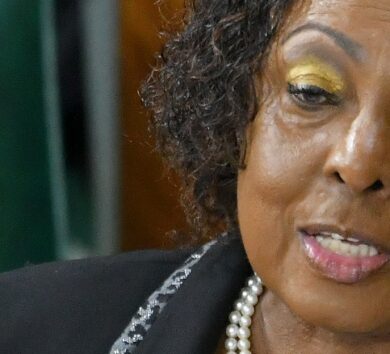

Westmoreland native *Timothy Brown was a 22 year old security guard when he was struck by a motor vehicle in 2008 while riding his motorcycle.
According to Brown, he was on his way to work and misjudged the distance between himself and a car during an overtake and was sent flying from his motorcycle, upon colliding with the car. As Brown was not wearing any protective gear or a helmet, he sustained head injuries, broke both his legs and sustained some cuts and scrapes to his upper extremities.
As a result of the crash, Brown was hospitalised for three months, and he required pins to hold his legs in place. This procedure cost J$47,000, which he pointed out, was extremely difficult for his family to pay. He also required J$70,000 to cover the cost of medication, and physiotherapy at J$5,000 a session.
Pain and disability
As a result of his and his family’s inability to fully fund his recovery, Brown was unable to undergo the surgical procedure that would have corrected his limp.
“I was told I would require surgery to correct the limp, which was J$700,000. I could not afford it because I wasn’t working and my sister who was now the family breadwinner could not afford it either,” Brown said.
He was forced to live with the pain and disability.
Brown has been unable to stand or walk for long periods and as such, has been unable to find full-time employment. He has settled instead for odd jobs to assist with his care.
His sister *Marie Smith added that caring for her brother has been challenging.
“It has been difficult looking after him and the wider family because my income can’t stretch sometimes. He does a little work here and there but it is not enough to sustain him so I have to assist where possible,” she revealed.
Brown estimates that he has lost millions of dollars in earnings since the accident, not only from full time jobs but from an informal delivery business he did for local shops in his community using his motorcycle.

Owen Smith, general manager, Jamaica Automobile Association (JAA), noted that the amount of money that has been attributed to Brown and his injuries is in keeping with the findings of the Cost of Care Report, a study commissioned and funded by the United Nations and the JN Foundation in 2017.
“The UN and JN Foundation Cost of Care Report presented the case of a 24-year-old
motorcyclist who was hit by a motor car. The report said at the time it cost approximately J$9
million to treat him. Consider that report was compiled roughly about eight years ago when
things were less expensive. Also, when you consider the salaries of the nurses, doctors, ward
assistants, things like soaps and other costs associated with the victim’s stay in hospital, you’re looking at probably close to J$15 million,” he surmised.
Smith also added that the extra strain that would have been added to Brown’s family in the last 15 years given that Brown was the main breadwinner for the family and has since been unable to have full-time employment.
Economic and social impacts
Smith highlighted why this example is a perfect demonstration of the importance of safety gear and helmets for motorcycle riders. The JAA general manager added that the economic and social impacts of road crashes on families and the country are the main reasons for the JAA being a major advocate for road safety. The Road Safety Unit in the Ministry of Transport reports that there were been 396 road fatalities up to December 11, with motorcyclists accounting for the majority of those deaths.
He said the JAA recently partnered with the Federation Internationale de l’Automobile (FIA) to
donate 700 helmets to bikers, and more will be done to advocate for helmet wearing.
“The donation of the helmets reflects a part of FIA’s commitment to road users; and as FIA’s key partner in Jamaica for almost a century, the JAA has always been committed in advocating for best practices as it relates to road use.”

Marlon Fletcher, former president of the Jamaica Motorcyclists Association, added that riding a motorcycle without the required gear and helmet is like exposing yourself to contagious disease. He added that helmets save lives and investing in a good helmet is worth the cost of getting one when weighed against potentially saving life.
He also noted that bikers, on average, spend more on their bikes than they ever would on a helmet and, therefore, riders should not hesitate to wear one when riding. The key factor to consider when purchasing a helmet is to make sure it is certified by the United States Department of Transport, or another equally relevant body, to ensure optimum protection.
*Names changed upon request







Comments